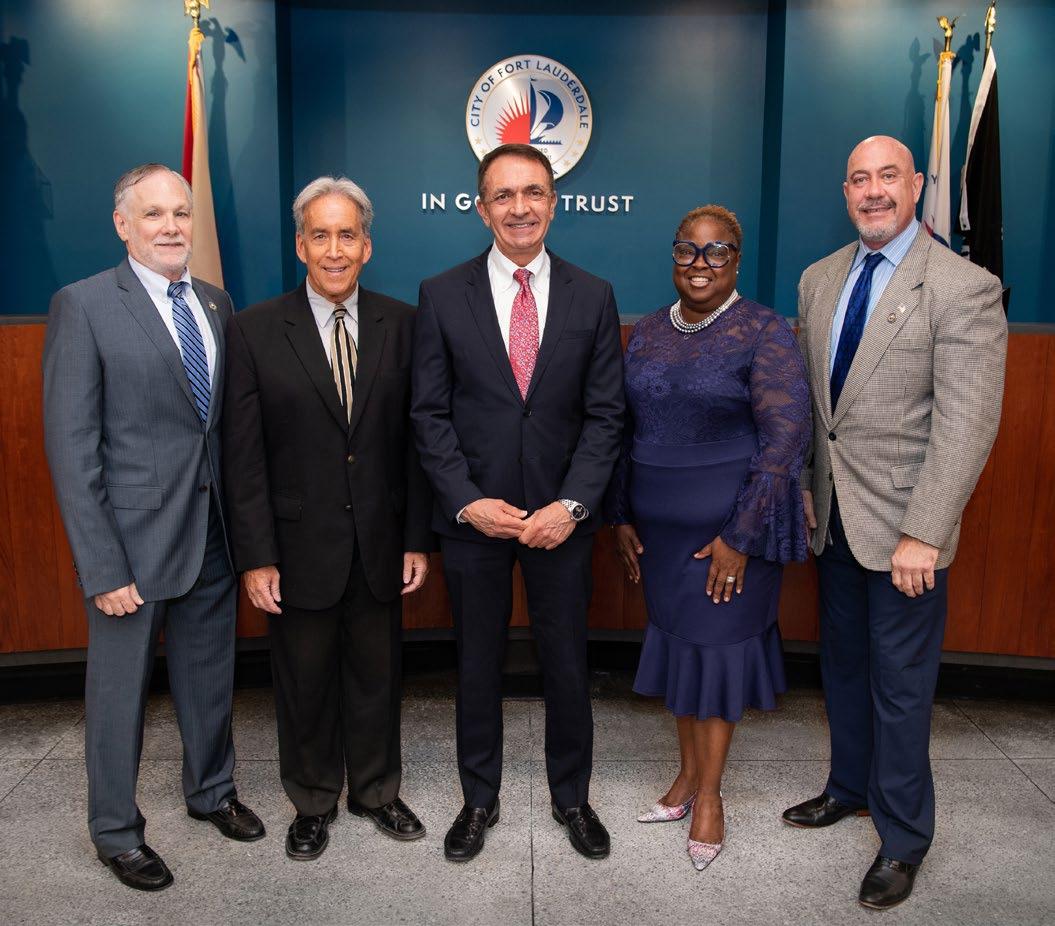





Dean J. Trantalis Mayor
Warren Sturman Vice Mayor/Commissioner | District 4
John C. Herbst
Commissioner | District 1
Steven Glassman Commissioner | District 2
Greg Chavarria City Manager
Daphnee A. Sainvil, J.D., LL.M Government Affairs Manager
Pam Beasley-Pittman Commissioner | District 3

The 2023 Legislative Priorities reflect the general position of the City Commission pertaining to upcoming legislation that would impact operations. Most importantly, this Program integrates the Commission’s Strategic Goals: Press Play Fort Lauderdale 2024, which brings focus and coordination to what we do every day as we make this community a place to live, work, play, and invest.
GOAL 1: Build a sustainable and resilient community.
GOAL 2: Build a multi-modal and pedestrian friendly community.
GOAL 3: Build a healthy and engaging community.
GOAL 4: Build a thriving and inclusive community of neighborhoods.
GOAL 5: Build an attractive global and local economic community marketplace.
GOAL 6: Build a safe and well-prepared community.
GOAL 7: Build a values-based organization dedicated to developing and retaining qualified employees.
GOAL 8: Build a leading government organization that manages all resources wisely and sustainably.
The City opposes legislation that infringes on the basic human and civil rights of Floridians. An integral portion of the advocacy effort by the Commission focuses on the Resolution process. Resolutions provide staff, advocacy teams, and state Executive and Legislative Branches with the City’s position regarding proposed legislation during Legislative Session.
The Commission supports legislation dedicating state resources for the development and enhancement of municipal cybersecurity and broadband services.
Address homelessness and the creation of housing opportunities including evaluation of activities and initiatives that can address the root cause of homelessness while identifying ways to create additional housing opportunities in the City.
The Commission supports full funding for the Sadowski Affordable Housing Trust Fund, the State Housing Initiative Partnership (SHIP); and other housing programs which aid income eligible residents, including individuals with disabilities.
Support the Florida League of Cities (FLC) Legislative Priorities and Policy Statements, unless specific issues conflict with the City’s approved Legislative Priorities.
Oppose legislative efforts to increase or eliminate the monetary limits on the waiver of sovereign immunity in current law.
Oppose legislation that modifies, restricts, or eliminates a municipality’s ability to levy and collect or spend franchise fees, communications service taxes, local business taxes, or other revenues.
Oppose legislation which shifts the financial burden from the state to local government, specifically municipalities.
Support funding for early learning education; and full funding for workforce readiness programs.
The Commission supports legislation:
• Allowing local government to regulate short-term rental properties, vacation rentals, and sober homes.
• That would change the date for the non-ad valorem assessment roll public hearing from September 15th to September 25th to avoid a special meeting of the City Commission regarding the budget.
• To amend Sec. 286.011, Florida Statutes allowing closed-door meetings on pre-suit liability claims.
The Commission opposes the Legislature’s attempt to preempt local government from prohibiting firearms in government buildings, schools, and other critical infrastructure areas.
Examine and address infrastructure needs related to water, wastewater, and stormwater. Integrate resilience in all decisions relating to current and future City operations, so that the city can effectively plan for, respond to, and quickly recover from disruptive events. Develop programs and implement strategies to improve traffic flow and evaluate new solutions that will alleviate congestion within the city.
The Commission supports legislation and funding for transportation enhancements focused on greenways, complete street initiatives, pedestrian safety, improving traffic flow, and mass transit development. The Commission further supports legislation that:
• Requires flood disclosures upon the sale of a property;
• Promotes energy conservation and alternative energy development; and
• Supports the inclusion of municipalities in the state environmental permitting process.
The Commission supports the repeal of state regulations prohibiting local governments from banning the use or sale of polystyrene products.
The Commission supports initiatives that focus on a fair and equitable justice system, which can be achieved through statewide comprehensive criminal justice reform. The Commission further supports legislation that modifies the Law Enforcement Trust Fund’s (LETF) evidentiary standard in a forfeiture proceeding and use of future forfeitures, which may result in an increase in amounts collected.
The Commission supports the expansion of blue emergency light use to fire rescue and EMS by amending s. 316.2397(2) and (3), Florida Statutes.
The Commission supports increased funding for historic preservation, and the restoration of full funding for the cultural arts. As a city known for its arts and culture, Fort Lauderdale supports all efforts to restore state funding to pre-recession levels.
The Commission supports funding for Fort Lauderdale Executive Airport capital projects, and the collaboration between the marine and aviation industries to promote economic development and tourism. Furthermore, the Commission supports VISIT Florida and the transfer of the spending authority of the Tourism Development Tax to municipalities based on tourism activity.
The Commission supports the reauthorization of the statewide Qualified Target Industry Tax Incentive (QTI) Program by the Florida Department of Economic Opportunity. The QTI Tax Refund was a tool available to Florida communities to encourage quality job growth in targeted high value-added businesses. Actual awards could be a maximum of:
• $1,000 per job for businesses paying at least 150 percent of the prevailing average annual wage or $2,000 per job for businesses paying at least 200 percent of the prevailing average annual wage;
• $2,000 per job if the business falls within a designated high impact sector OR if the business increases exports of its goods through a seaport or airport in the state by at least 10 percent in value or tonnage in each year of receiving a QTI refund;
• $2,500 per job (Brownfield Bonus) if project is located in a designated Brownfield area with BSRA (Brownfield site rehabilitation agreement); and
• $1,000 per job if the local financial support is equal to the base QTI award.
The Commission further supports the reauthorization of Film Tax Credits/Incentives, which would give credits to filmmakers that meet certain requirements. Since the state’s previous film rebate program ended, productions moved to states like Georgia, Louisiana, Texas, and North Carolina.
Education Enrichment Program | $704,836
Funding will build on the success of the City’ summer academic program and expand services to include afterschool enrichment, workforce exploration and citizenship development. Elevating its role in education, the city hosted learning pods while schools were shuttered and has continued to expand academic enrichment offerings through summer and afterschool programs since the pandemic. An academic summer program was piloted using CARES Act funding in the summers of 2021 and 2022, in which more than 1,600 children and youth benefited from the City’s summer program, resulting in participants mastering three or more reading and math skills.
Community Court Program | $100,000
The goal of the Community Court program is to reduce the daily jail population by addressing the needs of homeless, petty crime and municipal ordinance offenders. Community Court focuses on the root causes of each defendant’s issues, applying appropriate therapeutic and community service-based punishments. Participants must choose to take an active role in their rehabilitation. Furthermore, funding will support the operational expenses of the weekly court sessions in the City of Fort Lauderdale’s Commission Chambers.
The program will provide participants with access to services specific to their needs including hygiene kits, bus passes, birth certificates, and state issued identification in addition to access to social service and treatment agencies. Funding will also go towards Court operating costs such as advertising, office equipment, office supplies, parking fees for services providers, etc.
Support full funding for existing parks infrastructure projects. Specifically, the Commission supports:
As a result of recent cost escalations, many much-needed planned park improvements were either removed or deferred leading to a significant reduction in the community’s expressed desired elements and park needs. Funding will be used to resurface the Orange Bowl Football Field at Carter Park, which would result in an increase in usage by residents and visitors. Funding will also provide continued outdoor fitness opportunities in support of the city’s initiative to encourage its residents to live a healthy lifestyle.
Funding will be used for the installation of a new multi-purpose field at Hardy Park. A major benefit for taxpayers will be the conversion of the existing Bermuda grass fields at Hardy Park to artificial turf. This will greatly reduce maintenance demand, costs, and additional water usage. Today, water conservation is critical, thus, this improvement will promote the City’s sustainability initiatives. The artificial turf field will also increase residential and visitor use – encouraging the community to live a healthy lifestyle.
Support full funding for infrastructure projects that fight sea level rise. Specifically, the Commission supports:
• The identification of adequate funding for water, sewer, and stormwater infrastructure improvements.
• Maintaining, at minimum, $50 million recurring for beach re-nourishment, revitalization, and enhancement efforts.
This project is designed to improve and enhance Galt Ocean Drive - also known as the Galt Mile. Specifically, funding will be used to design the resurfacing of the roadway, widen the sidewalk, implement bike lanes, improve the roadway’s landscaping, and add street trees, streetlights, decorative pavers, and various safety improvements at crosswalks.
Stormwater Pump Station Redundancy| $700,000
During storms and power outages, the pump-station is not operational, causing flooding downtown and on abutting properties. Two gas generators will ensure that the station remains operational during power outages, increasing the resilience in the downtown area, which significantly reduces flooding impacts.
Sanitary Sewer System Rehabilitation of Basin B-14 | $1,500,000
The rehabilitation and replacement of the sanitary sewer collection mains, manholes, and laterals is required to reduce inflow and infiltration, which can adversely impact system capacity to transmit and treat wastewater. The rehabilitation will increase the lifecycle of all assets and reduce such flows within PS B-14 Basin.
Transportation in any city is a critical component to stability and growth. The Commission supports full funding for all transportation projects within the FDOT Workplan.
Riverland Road Traffic Calming Project | $1,000,000
The City of Fort Lauderdale identified the need to install traffic calming devices on Riverland Road to mitigate cut-through traffic and increase pedestrian and bicycle safety. The proposed project would install raised intersections and crosswalks to mitigate dangerous conditions.
LauderTrail Project | $900,000
In order to improve pedestrian and bicycle safety, create additional transportation options, and mitigate vehicle trips, the City Commission accepted a masterplan for LauderTrail. The 42-mile network is estimated at $92M and City staff has intentions to implement and construct segments over the next two decades. The City has an existing greenway (Flagler), and this proposed segment will connect to Holiday Park.